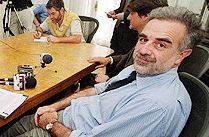ICC says Sudan will assist in arrest of LRA’s Kony
Oct 13, 2005 (THE HAGUE, Netherlands) — The Sudanese government is cooperating with the International Criminal Court in its pursuit of the first suspect it indicted, the leader of the feared Lord’s Resistance Army, Chief Prosecutor Luis Moreno-Ocampo said Thursday.
 In an interview to the Associated Press (AP), Moreno-Ocampo also said the court was studying Sudan’s efforts to prosecute Sudanese accused of war crimes in the troubled Darfur region. Sudan has rejected efforts by the international court to investigate war crimes in Darfur, saying it was trying cases in the violence-wracked region itself.
In an interview to the Associated Press (AP), Moreno-Ocampo also said the court was studying Sudan’s efforts to prosecute Sudanese accused of war crimes in the troubled Darfur region. Sudan has rejected efforts by the international court to investigate war crimes in Darfur, saying it was trying cases in the violence-wracked region itself.
While Sudan and the court differ over Darfur, Khartoum is cooperating in the case of Joseph Kony, one of five top Lord’s Resistance Army members named in a sealed indictment compiled by prosecutors of the permanent war crimes court. Warrants for their arrests have been distributed to Uganda, Congo and Sudan. The LRA has waged war against the Ugandan government for 19 years and had in the past been backed by Sudan.
“We believe Sudan is ready to cooperate with Uganda in the arrest of Kony,” Moreno-Ocampo told The AP in an interview. “They cooperate with our work. Today they are doing what we are requesting.”
“The arrest warrant will help to reduce political support and financial support … this way they will be isolated,” he said.
In June, the Netherlands-based international court announced the start of an investigation into alleged war crimes in Sudan’s Darfur region, where the government has been accused of supporting ethnic Arab militias, known as the Janjaweed, in a campaign of murder, rape and arson against ethnic Africans.
The ICC is evaluating Sudan’s own efforts to prosecute war crimes in Darfur, Moreno-Ocampo said, but “it is unlikely they could prosecute those who we are saying have to be prosecuted.”
Moreno-Ocampo stressed that the ICC is a court of last resort that intervenes when a state fails to prosecute culprits itself.
Moreno-Ocampo made the comments after meeting with diplomats in The Hague, including representatives from Sudan.
“There are countries working to prevent and control the crimes committed by the LRA,” Moreno-Ocampo said. He said he hoped the court’s first cases can go to trial in 2006.
Sudan once backed the LRA, even as Uganda supported the southern-based Sudan People’s Liberation Army in its civil war with the Sudanese government. But Sudan and Uganda normalized relations in 2001, Sudan’s southern civil war ended in January and the SPLM joined a national unity government, and Ugandan troops have since been allowed to operate in some parts of southern Sudan against the LRA.
Sudan’s First Vice President Salva Kiir Mayardit, the SPLM leader, had said Saturday that he would hand Kony over to the International Criminal Court. But Kiir said he did not know Kony’s whereabouts.
Moreno-Ocampo said the investigation of the Ugandan conflict is continuing, but that for now it is focused on the LRA, not the Ugandan military or government.
“There is no more doubt that the crimes committed by the LRA are far more dangerous and grave than the crimes committed by individuals in the Ugandan army, so I focus my investigation first on the LRA.”
Human rights groups say the Lord’s Resistance Army has over the years abducted more than 30,000 children, forcing them to become fighters, porters or concubines. The rebels have killed thousands of civilians and forced more than a million to flee their homes, but appears to have no clear political agenda and little contact with the outside world.
The conflict has displaced an estimated 1.9 million civilians in northern Uganda, according to Human Rights Watch. The New York-based group alleges that the government forces have also committed crimes against civilians.
The ICC indictment has not yet been released by the court’s judges, but Ugandan Defense Minister Amama Mbabazi provided the names of the defendants last week.
Apart from Kony, Mbabazi named his deputies Vinvent Otti, who recently fled to northeastern Congo, Rask Lukwiya, Okot Ojiambo and Dominic Ongwen, who was reportedly killed recently by government forces in northeastern Uganda.
Mbabazi said he believed Kony, Lukwiya and Ojiambo are in southern Sudan.
ICC prosecutors will charge five suspects for their criminal role in six major crimes in Uganda, the details of which have not been released to ensure the safety of witnesses.
The International Criminal Court was established in July 2002 and is mandated to prosecute war crimes in the 99 countries which have ratified its founding treaty, the Rome Statute. It cannot prosecute crimes before the days of its inception.
